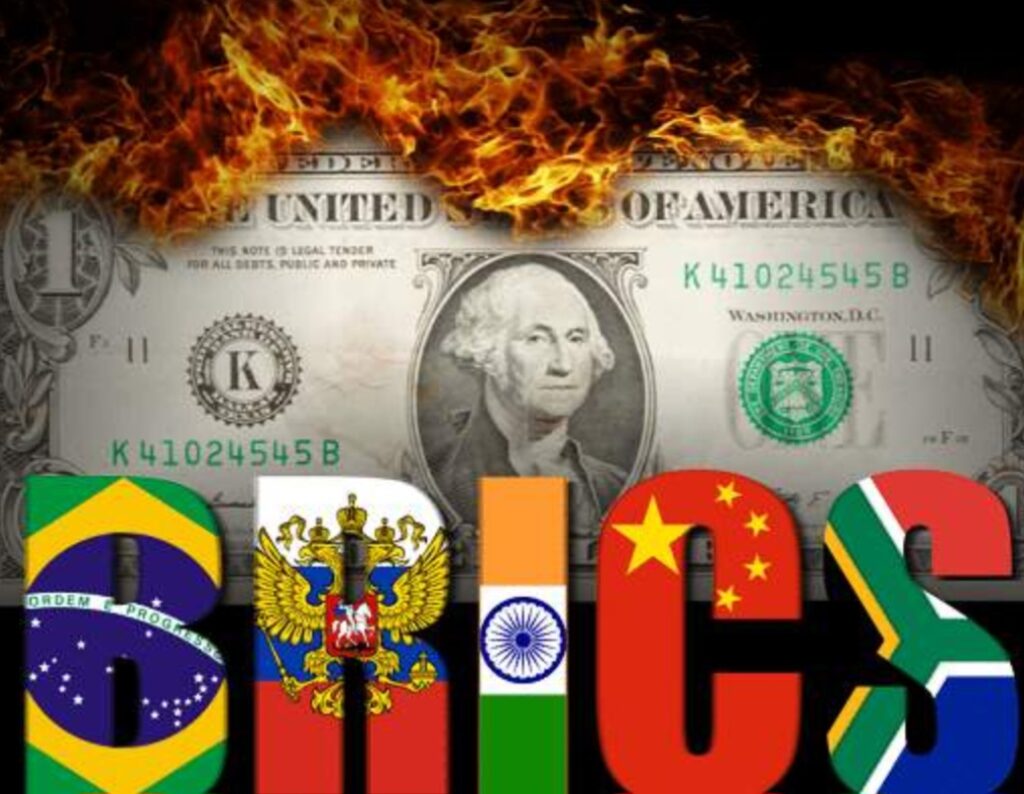By: Harshit Tokas, Research Analyst, GSDN

For the past 80 years, the United States dollar has reigned supreme as the world’s principal reserve currency. However, a consortium of developing nations, growing weary of Western hegemony in global finance, is determined to reshape the landscape of international monetary transactions. Spearheaded by the BRICS nations—Brazil, Russia, India, China, and South Africa—a movement towards de-dollarization is gaining momentum, signaling a seismic shift in the global financial order.
At the last BRICS summit held in Johannesburg in August 2023, Russian President Vladimir Putin emphasized the irreversibility and accelerating pace of de-dollarization. The BRICS leaders echoed concerns about the overwhelming dominance of the dollar, which is estimated to facilitate over 80% of international trade. Their aspirations for a more equitable global financial architecture stem from a desire to reduce dependency on Western-controlled mechanisms and mitigate the risks associated with unilateral economic sanctions, as evidenced by the sanctions imposed on Russia following its invasion of Ukraine and restrictions placed on China’s access to semiconductor technology.
Brazilian President Luiz Inacio Lula da Silva’s questioning of the necessity for all nations to conduct trade in dollars underscores the growing sentiment among emerging economies. The BRICS nations are exploring various avenues to diversify away from dollar hegemony, including the establishment of alternative currencies or payment systems. However, the path forward is riddled with complexities and challenges.
One proposed solution is the creation of a separate BRICS currency, potentially backed by a basket of currencies or even cryptocurrencies. While this idea may appear attractive on the surface, experts’ express skepticism due to the inherent difficulties in aligning the diverse economic interests and institutional frameworks of the member states. The notion of a unified BRICS currency raises questions about governance, stability, and the dominance of China within the grouping.
Professor Danny Bradlow of the University of Pretoria doubts the feasibility of reverting to the gold standard or adopting cryptocurrencies, citing their inherent risks and limitations in facilitating international trade. Furthermore, the idea of a BRICS currency is met with considerable skepticism, with analysts highlighting the disparities in economic size and power dynamics among the member states.
Despite the challenges, BRICS nations are exploring alternatives to the dollar, including the increased use of local currencies in bilateral trade agreements. Already, significant portions of trade between Russia, China, and India are settled in their respective currencies, signaling a gradual shift away from dollar reliance. However, achieving widespread convertibility and liquidity remains a formidable task, particularly in countries like India with stringent capital controls.
The quest for alternatives to the dollar reflects broader aspirations for a multipolar world order, characterized by greater diversity and inclusivity in financial transactions. South Africa’s BRICS ambassador, Anil Sooklal, emphasized the need for a multipolar financial system that offers choices beyond the traditional Western-dominated framework. Initiatives such as the Pan-African payment and settlement system exemplify regional efforts to reduce reliance on global banking networks like SWIFT and foster intra-continental trade.
Despite these efforts, analysts caution that the dollar’s dominance is likely to persist for the foreseeable future. Even if the BRICS were to establish a common currency, it would likely coexist alongside the dollar rather than supplanting it entirely. The dollar’s entrenched position as the benchmark currency for commodities like oil underscores its enduring relevance in global trade and finance.
In conclusion, while the push for de-dollarization represents a significant challenge to the existing financial order, the road ahead is fraught with complexities and uncertainties. The BRICS nations face formidable obstacles in their quest for alternatives, including divergent economic interests, institutional constraints, and the enduring supremacy of the dollar. Nonetheless, their collective efforts underscore a broader shift towards a more multipolar and inclusive global financial system, albeit one that will likely coexist with the dollar for the foreseeable future.


Its like you read my mind You appear to know so much about this like you wrote the book in it or something I think that you can do with a few pics to drive the message home a little bit but other than that this is fantastic blog A great read Ill certainly be back
My brother suggested I might like this website He was totally right This post actually made my day You cannt imagine just how much time I had spent for this information Thanks